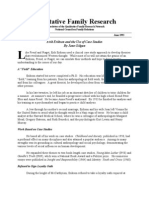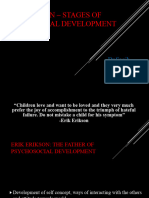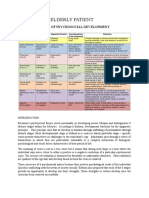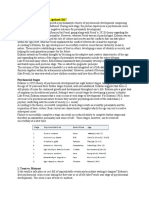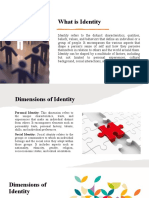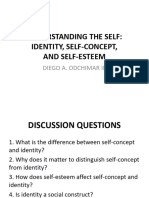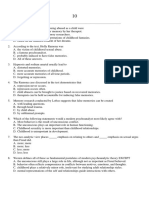0 ratings0% found this document useful (0 votes)
8 viewsTheory of Erickson
Theory of Erickson
Uploaded by
Иаснеех ГаякаCopyright:
© All Rights Reserved
Available Formats
Download as PPTX, PDF, TXT or read online from Scribd
Theory of Erickson
Theory of Erickson
Uploaded by
Иаснеех Гаяка0 ratings0% found this document useful (0 votes)
8 views26 pagesCopyright
© © All Rights Reserved
Available Formats
PPTX, PDF, TXT or read online from Scribd
Share this document
Did you find this document useful?
Is this content inappropriate?
Copyright:
© All Rights Reserved
Available Formats
Download as PPTX, PDF, TXT or read online from Scribd
Download as pptx, pdf, or txt
0 ratings0% found this document useful (0 votes)
8 views26 pagesTheory of Erickson
Theory of Erickson
Uploaded by
Иаснеех ГаякаCopyright:
© All Rights Reserved
Available Formats
Download as PPTX, PDF, TXT or read online from Scribd
Download as pptx, pdf, or txt
You are on page 1of 26
Erick Erickson stages of development
Prepared by sharoon rufan
Eric Erikson (1902 – 1994)
Born in Germany on June 15th 1902.
He was an artist and a teacher in the late 1920s when he
met Anna Freud, an Austrian psychoanalyst. With Anna’s
encouragement, he began to study child psychoanalysis at
the Vienna Psychoanalytic Institute.
He immigrated to the US in 1933 and taught at Yale and
Harvard University.
It was at this point in his life that he became interested in
the influence of society and culture on child development.
To satisfy his curiosity, he studied groups of American
Indian Children to help formulate his theories. Studying
these children enabled him to correlate personality growth
with parental and societal values.
Field of Research
He studied groups of Aboriginal children to learn about the
influence of society and culture on child development.
From this, he developed a number of theories, the most
famous being his psychosocial development.
He believed that humans have to resolve different conflicts
as they progress through each stage of development in the
life cycle.
Erikson’s theory consists of eight stages of development.
Each stage is characterized by a different conflict that must
be resolved by the individual. If a person is unable to
resolve a conflict at a particular stage, they will be confront
and struggle with it later in life.
ERIKSON’S THEORY
Development of an individual is the result of his
interaction with social environment
Conceptualized development as psychosocial
Individual moves through eight stages of psychosocial
development. Based on epigenetic principle.
Resolution of a stage lays the foundation for negotiating
the challenges of the next.
Emphasis on society, relationships and interaction with
people
Erikson’s Stages of Psychosocial
Development
8 successive stages over the lifespan
Addresses bio, social, situational, personal influences
Crisis: must adaptively or mal-adaptively cope with
task in each developmental stage
Respond adaptively: acquire strengths needed for next
developmental stage
Respond mal-adaptively: less likely to be able to adapt
to later problems
Stage 1: Basic Trust vs. Mistrust
Approximate age : Birth to 18 months (infancy)
Psychological crisis : Trust /mistrust
Significant relationship: Maternal Person.
Totally dependent on others
Caregiver meets needs: child develops trust
Caregiver does not meet needs: child develops
mistrust
Basic strength: Hope
Belief our desires will be satisfied
Feeling of confidence
Implications
Parents should ensure a trusting relationship with
the child.
Satisfying the needs develops trust.
Anxiousness and anger develops mistrust
Stage 2: Autonomy vs. Shame and Doubt
Approximate age: 18 months to 3 year (toddlerhood)
Psychological crisis : Self autonomy/doubt.
Significant relationship : Parental persons.
Children try to do things Independently.
Growing mobility
Language acquisition
Ego-strength – will (Determination to exercise freedom
of choice in face of society’s demands)
If the freedom and exploration are encouraged, toddler
develops autonomy, if they are overly restricted, they
experience shame, self doubt
Implications
Arrange for each child to have something which are
his own and with which he can identify.
Values the things the child makes
Development of early trust is necessary
Stage 3: Initiative vs. Guilt
Approximate age : 3 to 6 year (preschooler)
Psychological crisis : Initiative / guilt.
Significant relationship : Basic Family.
Resolution of Oedipus or Electra Complex
Ego strength- Purpose (Courage to envision and
pursue goals)
Takes initiative in interacting with the environment, if
this tendency is censored, through criticism or control,
develop a sense of guilt
Implications
Do not punish children for their initiative-ness.
Create a playful atmosphere.
Value children's play and talk to them about their play.
Stage 4: Industriousness vs. Inferiority
Approximate age : 6 to 12 year (elementary school age)
Psychological crisis : Industry/inferiority
Significant relationship : Neighborhood /school
Peers become important and the child tries to measure and
evaluate himself with peers.
Children seek to establish a clear identity
Child develops cognitive abilities to enable in task completion
(school work, play)
Parents/teachers do not support child’s efforts: child develops
feelings of inferiority and inadequacy
Basic strength: Competence
Exertion of skill and intelligence in pursuing and completing tasks
Implications
Assign roles for them and appreciate for their effort.
Make confidence in them by giving opportunities to
express their abilities
Praise them for doing their best and encourage to
finish task
Strengthen the school environment
Stage 5: Identity vs. Role Confusion
Approximate age : 12 to 18 year (adolescence)
Psychological crisis : Identity / role confusion
Significant relationship :peer groups /models of leadership
Children seek to establish a clear self identity (understands
his own unique traits)
Begins with puberty
Role confusion
Ego strength- Fidelity and loyalty
Failure to discover self identity, results in identity crisis and
role confusion.
Fidelity;
Sincerity, genuineness, sense of duty in relationships with other
Implications
Help the students to identify their roles that are
socially acceptable.
Give reinforcement towards positive roles.
Prevent them from unlimited imaginations
Assign duties and responsibilities
Stage 6: Intimacy vs. Isolation
Approximate age : 20 to 40 (young adulthood)
Psychological crisis : Intimacy / Isolation
Significant relationship : Partners in Friendship, sex and co-
operation.
Selection of a mate
Establishment of an occupational pattern
Harmonious relationships with others
Intimacy- “finding oneself, but losing oneself in another
person” Erickson.
Undertake productive work and establish intimate relationships
Inability to establish intimacy leads to social isolation
Basic strength: Love
Implications
Develop harmonious relationship
Develop the habit- To love and to work
Stage 7: Generativity vs. Stagnation
Approximate age : 40-65 (middle adulthood )
Psychological crisis : Generativity /self
absorption(stagnation).
Significant relationship: shared household
Interest in establishing and guiding the next generation.
Focus on career and family
Involve in creative pursuits – voluntary works art science,
etc. By failing to achieve these objectives, one become
stagnant (disinterested in others, concerned only with self)
Basic Ego strength: Care
-Broad concern for others
-Need to teach others
Implications
Be active in home and community
Stage 8: Ego Integrity vs. Despair
Approximate age : 60 + (Late adulthood)
Psychological crisis: Integrity/ Despair
Significant relationship : “Mankind”
Evaluation of entire life(Time of introspection)
Integrity: Look back with satisfaction
Despair: Review with anger, frustration
Acceptance of accomplishments, failures and ultimate
limitation, Accept the finality of death
If feels his life as unproductive, feel guilty about past,
becomes dissatisfied with life and develop despair
Basic strength: Wisdom
-Detached concern with the whole of life
Implications
Introspection is necessary
Listen to elderly people.
Contributions of Erikson
Personality develops throughout the lifetime
Identity crisis in adolescence
Impact of social, cultural, personal and situational
forces in forming personality
Criticisms of Erikson
Ambiguous terms and concepts
Lack of precision
Some terms are not easily measured empirically
References
Rana, M. H., Ali, S., & Mustafa, M. (2012). A
Handbook of Behavioral Sciences for Medical &
Dental Students. University of Health Sciences.
Sharma, K. H., & Maan, G. (2018). psychology for
Nurses. Lotus Publishers.
You might also like
- Tony Tilney-Dictionary of Transactional Analysis PDFDocument161 pagesTony Tilney-Dictionary of Transactional Analysis PDFAlina Comendant100% (4)
- Reflection On Erik Erikson Stages of DevelopmentDocument5 pagesReflection On Erik Erikson Stages of DevelopmentFeby DemellitesNo ratings yet
- Erikerikson Stages of DevelopmentDocument42 pagesErikerikson Stages of DevelopmentKyZerFOnteverosNo ratings yet
- Ped 101 Midterm ReviewerDocument6 pagesPed 101 Midterm ReviewerMarielle Panollera100% (2)
- Artifact Perks of Being A WallflowerDocument3 pagesArtifact Perks of Being A Wallflowerapi-224128717No ratings yet
- Erik Erikson & Case Study ResearchDocument2 pagesErik Erikson & Case Study ResearchJane Gilgun50% (2)
- Erik Erickson (1902 - 1994) : Theory of Psycho-Social DevelopmentDocument5 pagesErik Erickson (1902 - 1994) : Theory of Psycho-Social DevelopmentMuhammad Ather SiddiqiNo ratings yet
- Psychosocial TheoryDocument30 pagesPsychosocial TheoryChing MaravillaNo ratings yet
- Erik Erikson: Psychosocial Development Theory: Reporter: Kevin Lendel C. DucaoDocument16 pagesErik Erikson: Psychosocial Development Theory: Reporter: Kevin Lendel C. DucaoRave Lawrence DucaoNo ratings yet
- 1122Document8 pages1122claridyltolete1814No ratings yet
- Psychosocial Theory of Erik Erikson: Group 2Document22 pagesPsychosocial Theory of Erik Erikson: Group 2Justine May GervacioNo ratings yet
- Erik Erikson: The Life-Span ApproachDocument17 pagesErik Erikson: The Life-Span ApproachAnkit guptaNo ratings yet
- Erik Erikson: The Life-Span ApproachDocument17 pagesErik Erikson: The Life-Span Approachapi-25993162No ratings yet
- 2020 Eric Erickson Psychoanalysis TheoryDocument29 pages2020 Eric Erickson Psychoanalysis TheoryHarley Justiniani Dela CruzNo ratings yet
- Erik EriksonDocument20 pagesErik EriksonRhea DaetNo ratings yet
- Felicity Eric EriksonDocument4 pagesFelicity Eric EriksonFelicity MarieNo ratings yet
- Erickson's Theory PDFDocument19 pagesErickson's Theory PDFNatasha ShangeNo ratings yet
- Erikson's 8 Stages of Psychosocial DevelopmentDocument6 pagesErikson's 8 Stages of Psychosocial DevelopmentJamesBuensalidoDellavaNo ratings yet
- Erik Erikson's Psychosocial Theory of DevelopmentDocument15 pagesErik Erikson's Psychosocial Theory of DevelopmentClyde Conde100% (1)
- Psycho-Social Development by GSDocument12 pagesPsycho-Social Development by GSjugaadjagguNo ratings yet
- Module 4Document30 pagesModule 4PRANATHI REDDYNo ratings yet
- Erikson's Psychosocial DevelopmentDocument38 pagesErikson's Psychosocial DevelopmentAmeil OrindayNo ratings yet
- Behavioural Science AssignmentDocument6 pagesBehavioural Science AssignmentERIC KIMATHI KAMUNDINo ratings yet
- 1-Develomental Theories Part OneDocument33 pages1-Develomental Theories Part OneTotaAl-mutairiNo ratings yet
- Ericksons Psychosocial TheoryDocument5 pagesEricksons Psychosocial TheoryRyan Albert Balane ElizesNo ratings yet
- Erikson Psychosocial StagesDocument10 pagesErikson Psychosocial StagesMartin Alvin100% (3)
- MT Educ. Erik Eriksons Psychosocial Stages of DevelopmentDocument58 pagesMT Educ. Erik Eriksons Psychosocial Stages of DevelopmentEMMANUEL CHARLES ADRIAN BAUTISTANo ratings yet
- Prof. Ed. 1 - Module 6Document4 pagesProf. Ed. 1 - Module 6Jomar NavarroNo ratings yet
- 2.2.3 Erik Eiksons Psychosocial DevelopmentDocument6 pages2.2.3 Erik Eiksons Psychosocial DevelopmentEmil BarengNo ratings yet
- DR - Harpal Kaur Aujla (Associate Professor) Akal College of Education, Mastuana Sahib Sangrur (Punjab)Document20 pagesDR - Harpal Kaur Aujla (Associate Professor) Akal College of Education, Mastuana Sahib Sangrur (Punjab)Renalyne Andres BannitNo ratings yet
- Erickson TheoryDocument35 pagesErickson Theorysami khanNo ratings yet
- 530 Hand OutDocument2 pages530 Hand OutsuzetteNo ratings yet
- Theoris of PersonalityDocument11 pagesTheoris of PersonalityandrewwanjjaNo ratings yet
- Stage 1: Trust vs. MistrustDocument3 pagesStage 1: Trust vs. MistrustCep Loreine GendranoNo ratings yet
- Psychological Theories of Human Development (Freud To Erikson)Document21 pagesPsychological Theories of Human Development (Freud To Erikson)PiaElemosNo ratings yet
- A Contrastive Analysis of TheoriesDocument3 pagesA Contrastive Analysis of TheoriesRaquel OrtegaNo ratings yet
- A Contrastive Analysis of TheoriesDocument3 pagesA Contrastive Analysis of Theoriesyağmur özelNo ratings yet
- Erik Erikson's: Stages of Psychosocial DevelopmentDocument44 pagesErik Erikson's: Stages of Psychosocial Developmentbea locsinNo ratings yet
- Erik EriksonDocument30 pagesErik EriksonHaris PeaceNo ratings yet
- Module 9-Erickson's Psycho-Social Theory of DevelopmentDocument14 pagesModule 9-Erickson's Psycho-Social Theory of DevelopmentKimberly Vergara100% (1)
- Psychological PerspectivesDocument28 pagesPsychological PerspectivesmabborangjanineNo ratings yet
- PsychologyDocument16 pagesPsychologynaomiNo ratings yet
- Erik Erikson - Psychosocial Stages - Simply PsychologyDocument5 pagesErik Erikson - Psychosocial Stages - Simply PsychologyBSN 2014No ratings yet
- Erik Erikson - : Theory Centered On Psychosocial Development Rather Than Psychosexual Development. Sigmund FreudDocument14 pagesErik Erikson - : Theory Centered On Psychosocial Development Rather Than Psychosexual Development. Sigmund FreudRaikzel BondestoNo ratings yet
- Erik Erikson'sDocument11 pagesErik Erikson'sKhushbooNo ratings yet
- Erik Erikson's Stages of Psychosocial DevelopmentDocument6 pagesErik Erikson's Stages of Psychosocial DevelopmentSophia Daphne Canlas FaelnarNo ratings yet
- Psychodynamic Perspective 5Document21 pagesPsychodynamic Perspective 5minahilgee5No ratings yet
- EriksonDocument10 pagesEriksonhajiaewenlaNo ratings yet
- EriksonDocument4 pagesEriksonprecious deanonNo ratings yet
- Infancy: Trust vs. Mistrust (0 To 1 Year)Document5 pagesInfancy: Trust vs. Mistrust (0 To 1 Year)karyl lynNo ratings yet
- Erikson's Theory of Development: Dwight Alipio - Sheena Ortiz - Aljean Fernandez - Venus DamianDocument10 pagesErikson's Theory of Development: Dwight Alipio - Sheena Ortiz - Aljean Fernandez - Venus DamianMaria Feliza GarciaNo ratings yet
- Psychosocial Theory Report Final - 122924Document7 pagesPsychosocial Theory Report Final - 122924balusdanjeelanNo ratings yet
- Development Stages in Middle and Late AdolescenceDocument21 pagesDevelopment Stages in Middle and Late AdolescenceJuju ZenemijNo ratings yet
- Erickson's Theory of Psychosocial DevelopmentDocument16 pagesErickson's Theory of Psychosocial Developmentjuljuliemer100% (3)
- Unit IIDocument9 pagesUnit IIShoba GuhanNo ratings yet
- Module 3Document7 pagesModule 3erikalombardo8No ratings yet
- AKA Erik Homburger EriksonDocument34 pagesAKA Erik Homburger EriksonvinwaleedNo ratings yet
- Erik Erikson PowerpointDocument13 pagesErik Erikson Powerpointapi-315109042No ratings yet
- Social and Psychological Development: Management Sciences Department-BUKCDocument43 pagesSocial and Psychological Development: Management Sciences Department-BUKCmohsinNo ratings yet
- AssignmentDocument7 pagesAssignmentAshwini Harwale SonwaneNo ratings yet
- Erikson's Theory of Psychosocial Development What Is Psychosocial Development?Document23 pagesErikson's Theory of Psychosocial Development What Is Psychosocial Development?Sowmya VijayNo ratings yet
- Erikson's Stages of Psychosocial DevelopmentDocument2 pagesErikson's Stages of Psychosocial DevelopmentMarie Ann Toong QuicoNo ratings yet
- Freuds TheoryDocument18 pagesFreuds TheoryBaden BueNo ratings yet
- UNDSELF Lesson3Document16 pagesUNDSELF Lesson3V-JAY BACKONGNo ratings yet
- Shaping Your Child's Healthy Self-Esteem-Self-Worth: Emotional IntelligenceFrom EverandShaping Your Child's Healthy Self-Esteem-Self-Worth: Emotional IntelligenceNo ratings yet
- Erikson's TheoryDocument16 pagesErikson's TheoryKhushbooNo ratings yet
- Erik Erikson by Saul Mcleod, Updated 2017Document13 pagesErik Erikson by Saul Mcleod, Updated 2017Joyce Ann NunezNo ratings yet
- Exploring Issues of Identity and BelongingDocument43 pagesExploring Issues of Identity and BelongingAbdul Sattar Shah KhattakNo ratings yet
- Eriksons Psycho Social DevelopmentDocument72 pagesEriksons Psycho Social DevelopmentJulie Ann GinesNo ratings yet
- IdentityDocument13 pagesIdentityAmatul MusawarNo ratings yet
- Human Personality Erik Erickson Individual TaskDocument6 pagesHuman Personality Erik Erickson Individual TasknadiaNo ratings yet
- Finals TFNDocument14 pagesFinals TFNSoleil LamperogueNo ratings yet
- Movie Analysis EssayDocument3 pagesMovie Analysis Essayapi-281781447100% (1)
- Non Nursing Theories 1Document43 pagesNon Nursing Theories 1Nicole SilorioNo ratings yet
- Erik Erikson's Theory of Development: A Teacher's ObservationsDocument5 pagesErik Erikson's Theory of Development: A Teacher's ObservationsJoshua BugaoisanNo ratings yet
- Erik EricksonDocument3 pagesErik Ericksonmpool9236No ratings yet
- Eriksons Psychosocial Development TheoryDocument12 pagesEriksons Psychosocial Development TheoryANGELIKA ABORITANo ratings yet
- Erik Erikson Stages Psychosocial Development PDFDocument2 pagesErik Erikson Stages Psychosocial Development PDFDan100% (1)
- Identity, Self-Concept, and Self-Esteem (Diego A. Odchimar III, 2023)Document101 pagesIdentity, Self-Concept, and Self-Esteem (Diego A. Odchimar III, 2023)Diego A. Odchimar IIINo ratings yet
- Psycho Social Theory of Development 20230913 221207 0000Document15 pagesPsycho Social Theory of Development 20230913 221207 0000Norhana NorodinNo ratings yet
- Erik Erikson N BronfennerDocument4 pagesErik Erikson N BronfennerOng Ai LisNo ratings yet
- Psychosocial Theory of DevelopmentDocument53 pagesPsychosocial Theory of DevelopmentJamila Nicole Acosta100% (2)
- Life Review-Basic ConceptsDocument16 pagesLife Review-Basic ConceptsUdisha MerwalNo ratings yet
- Erikson Psychosocial TheoryDocument3 pagesErikson Psychosocial TheoryThea JudeNo ratings yet
- Erikson's 8 Stages of Psychosocial DevelopmentDocument6 pagesErikson's 8 Stages of Psychosocial DevelopmentJamesBuensalidoDellavaNo ratings yet
- StudentDocument28 pagesStudentTurki Alsaleh100% (1)
- Full Download Solution Manual For Kail, Children and Their Development, 7th Edition PDFDocument68 pagesFull Download Solution Manual For Kail, Children and Their Development, 7th Edition PDFsulcajmhmd100% (1)
- Scrapbook FinalDocument15 pagesScrapbook FinalANGEL VALLERIE OLARTENo ratings yet
- Biography of Philosophers: SocratesDocument13 pagesBiography of Philosophers: SocratesChristian LimonNo ratings yet
- Erik Erikson: "Psychosocial Development"Document5 pagesErik Erikson: "Psychosocial Development"Felicity Marie100% (1)





